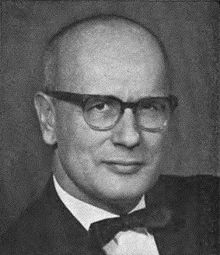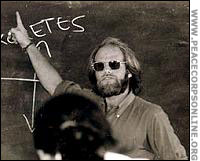Remembering the murder of PCV Deborah Gardner (Tonga)
In the late Nineties, shortly after I had taken over the job of manager of the New York Recruitment Office for the Peace Corps, I got a call from a reporter at the New York Observer newspaper. I thought he was calling to ask me about the Peace Corps and to write an article about the agency. Well, in a way he was, but he started by asking if I knew anything about the murder of a young woman in Tonga in 1975. The reporter’s name was Philip Weiss and he didn’t realized he had stumbled on an RPCV who was fascinated by the history of the Peace Corps and obsessively collected PCV stories.
Phil Weiss was also obsessed, but by the murder of this PCV in Tongo. In 1978, when he was 22 and backpacking around the world, he had crashed with a Peace Corps Volunteer in Samoa named Bruce McKenzie. This PCV told him how on Tonga a male Volunteer had killed a female Volunteer and gave Phil the gory details.
 Weiss came back to the US to have a career as a journalist, writing for the New York Times Magazine, Esquire, Harper’s and other magazine but the story of the murder in Tonga stayed with him and he began to do his research, beginning with other Tonga RPVCs, including Jan Worth (Tonga 1976-78), who would publish in 2006 the novel Night Blind that uses a version of the murder in her book.
Weiss came back to the US to have a career as a journalist, writing for the New York Times Magazine, Esquire, Harper’s and other magazine but the story of the murder in Tonga stayed with him and he began to do his research, beginning with other Tonga RPVCs, including Jan Worth (Tonga 1976-78), who would publish in 2006 the novel Night Blind that uses a version of the murder in her book.
When Weiss telephoned me, he was beginning to do research with “official” Peace Corps and was, as he told me, surprised at how forthcoming I was (well, I was an RPCV after all; and we know how they like to talk!) Weiss would cite Peace Corps Writers and the articles we had done in our newsletter on that murder in his Acknowledgements when his book American Taboo A Murder in the Peace Corps was published by HarperCollins in 2004. He also cited, “The best book on the history of the Peace Corps in this era . . . The Peace Corps Experience: Challenge and Change, by P. David Searles.”
Several years after that, writing for the New York Observer, Weiss would in the January 2, 2007 issue, give the murder of Deborah Gardner another spin in an article entitled: The Dark Side of Gerald Ford’s Legacy: the Peace Corps Murder. — JCoyne
•
The Dark Side of Gerald Ford’s Legacy:
the Peace Corps Murder
Phil Weiss
New York Observer, January 2, 2007

Deborah Gardner
Let’s add one thing to Gerald Ford’s legacy: the greatest scandal in Peace Corps history, the freeing of a murderer to save the image of the agency, and to try to preserve Pres. Ford’s reelection hopes in ’76.
Ford never learned of the scandal, that’s what his office told me when I was writing a book about it a few years back. Henry Kissinger, his Secretary of State, also said in 2002 that he had no memory of the case. But Ford’s midlevel political appointees handled the matter, suppressing it and botching any idea of justice.
The murder took place three weeks before the presidential election on Oct. 14, 1976 on a Martha’s Vineyard-sized island in the South Pacific, Tongatapu in the Kingdom of Tonga. A Peace Corps Volunteer named Dennis Priven, then 24, from Brooklyn, murdered a fellow volunteer, Deborah Gardner, 23, of Tacoma, WA., by stabbing her repeatedly in her hut that night. An introverted high school chemistry teacher, Priven had been stalking Gardner, a biology teacher, for weeks. She had rejected his advances. On October 16, her body left the island. Two days after that her funeral took place in Tacoma with no media attention.

John D. Dellenback
Ford’s appointees at Peace Corps and State had bottled the case up. The director of the Peace Corps, a former Ford crony in the House, moderate Oregon Republican John Dellenback, went campaigning for Ford right after the murder happened, and made sure that no one heard about it. Dellenback had led prayer breakfasts on the Hill to help the government heal after Watergate, but he did nothing for Deborah Gardner. Peace Corps violated its own rules on publicity, making sure not to release news of the murder for 19 days, till November 2 the afternoon of the general election. The story was buried in the newspapers.
Peace Corps and State then threw the American gov’t behind Priven, discouraging the Gardner family from taking any role in the case. “Once out, all out,” political appointees warned Deb Gardner’s mother a not so subtle suggestion that if the case was aired, her daughter’s privacy would be thoroughly compromised. The U.S. paid for Priven’s defense, and paid for a psychiatrist to come out from Hawaii to examine and then testify for the disturbed young man, all in an effort to spare him the outcome that any Tongan would have experienced: the gallows.
The Tongan government and prosecutors were pursuing Gardner’s interests, but those officials felt totally manipulated by Ford appointees who converged on the island. It was a tiny country of 100,000 people and no traffic lights, and it turned to New Zealand for what limited assistance it got in the case. Priven was found not guilty by reason of insanity in December 1976, and Ford’s appointees, including the Ambassador to New Zealand and Tonga, Armistead Selden, another former congressional buddy, and the charge d’affaires, Robert Flanegin, then went to work to get Priven released.

Dennis Priven in Tonga
The Americans promised to put Priven away back here. But these promises meant nothing. Priven came back to Washington in January 1977, days before Jimmy Carter’s inauguration, and though Peace Corps mounted a flimsy effort to keep him in Sibley Hospital, Priven declined the offer and within days returned to Brooklyn a free man just three months after he had stabbed a fellow volunteer 22 times. Not a word in the press. A few years later, he was working for Social Security as a computer dude.
Yes, Gerald Ford was a moderate Republican steward who helped heal the nation after Watergate fair enough. But he was also a nincompoop on foreign relations who issued vaguely-spiritual bromides while watching out keenly for his own political ambitions. Those presidential attributes, reflected in his appointees, allowed the Peace Corps murderer to slip between the cracks…

This is a disturbing story, and I wonder why subsequent officials, simply out of general concern for public safety, didn’t later move to have the court-recognized “insane person” committed.
It also raises some questions about the much-vaunted PC selection process, loaded with psychiatrists and psychologists, missing a person obviously on the edge. But then, I remember the PC selection process dropped the ball big-time with my original training group, including one, overtly racist and anti-semitic, who would go on to threaten the life of a host-country individual. And “selected out” two applicants we all later believed would have made good volunteers.
With the current attention on school shootings and gun violence lately, this story may have relevance still today. John Turnbull New Mexico
John,
I believe that during the early 70s, almost all Peace Corps training moved from stateside colleges to host countries.The Selection Boards that dominated Peace Corps training during the 60s, became less and less significant. C. David Searles, in his book,”The Peace Corps Experience – Challenge and Change 1969-1976″ describes how he changed training and selection procedures as PC Director in the Philippines.
One of the very real problems, I believe, with the Selection procedures of the 1960s, is that no one really knew the reasons a Trainee would be “selected out.” I think many times it had nothing to do with the trainee personally, but background checks might have revealed that someone in the family was involved with top security work and that would render the trainee ineligible for service.
As reported elsewhere over the years, John, the Peace Corps has been criticized for its handling of the murder, particularly since Weiss’ book was published, acquainting a wider public with the details. Criticisms include that Priven’s defense in Tonga was supplied by the Peace Corps, that the Peace Corps allegedly went to great efforts to bury the incident, and that Priven was not suffering from a psychiatric disorder that would have allowed him to mount a successful psychiatric defense in an American court.
In 2005, the U.S. Attorney’s office in Seattle looked into the possibility of bringing charges against Dennis Priven for the murder of Deborah Gardner but concluded that Priven could not be tried in any jurisdiction in the United States. Although a 1994 law allows prosecutors to bring charges against an American citizen who kills another American citizen while overseas, and the PATRIOT Act allows US Courts to try Americans for crimes they may have committed while overseas, neither of these laws were in effect at the time the murder occurred in 1976 and they cannot therefore be applied retroactively to the Gardner murder case, the US Attorney’s office concluded.
Although Priven’s psychiatrist at his trial in Tonga testified that Priven suffered from latent paranoid schizophrenia, a panel of psychiatrists who discussed the murder as a case study in 2005 concluded that Priven was probably suffering from narcissistic personality disorder, which manifests itself as an obsessive involvement with one’s own interests and a lack of empathy for others. They further concluded that had he been charged in an American court, he would not have been able to mount a successful defense “by reason of insanity.”
Let’s make sure that the current tide for pushbacks against the Weinstein’s of the world, the mass shootings, the NRA and the continued war against minorities are heard. Thise who are willing to speak up and march down our streets are taking actions to shift our trajectory. We need to listen to young people, women and minorities who may still believe what our country is supposed to stand for. That’s the gift we can give them or is it that they are giving us.
Thanks, John (C) for taking the time to describe the subsequent legal events surrounding this case. I can only imagine that the Tongan court was anxious to avoid a confrontation with the USA, and trusting that somehow American jurisprudence would deliver justice.
Going back to the panel of psychiatrists studying the case in 2005, and concluding “. . . narcissistic personality disorder, which manifests itself as excessive involvement with ones own interests, and lack of empathy for others.”, can we imagine anything more antithetical to what a successful PCV is, than THAT ? Again, going back to the PC selection process, can we imagine with nine weeks of testing and evaluation, even a nimrod psychiatrist missing something like that ?
Thinking again of my own early PC training, and having had the unusual advantage to have been able, years afterward, to interview some of the individuals who had been on the selection committee deciding about my group, I think today that there was a strong conflict between First Goal and Second Goal, and which applicants would be best at one, vs best at the other. For those two applicants “selected out” of my training group, with the benefit of hindsight and perspective, probably an apology is in order. John Turnbull New Mexico
The transition period between the political administration of one party and the change to the administration of the other political party can be a particularly difficult time for Peace Corps Volunteers. Gardner was murdered in the closing days of the 1976 political campaign. Ford, a Republican was defeated and Carter, a Democrat won. Trial of Priven took place in December of 1976 during the transition from the Republican to the Democratic adminstration. Peace Corps was not an independent agency at the time, but rather a subdivision within ACTION. Michael P. Balzano was the Director of ACTION, at the time of the murder. I don’t know when he resigned his position. Sam Brown became the new ACTION Director in January of 1977, when Carter took office. I could not find information on who exactly was still in charge at ACTION when Priven arrived in the states.
I think serving Peace Corps Volunteers are very vulnerable during these transition times. In February of 1977, a PCV was captured and held for three years by insurgents in South America. A PCV went missing in December of 2000 in Bolivia and remains missing, today. And tragically, Kate Puzey was murdered in Benin, six or seven weeks after Obama took office and Jody Olsen became Acting Peace Corps Director, pending the appointment of a permanet Director by Obama.
Perhaps Mr. Priven should run for President. After all, he has a “narcissistic personality disorder which manifests itself as an obsessive involvement with one’s own interests and has a lack of empathy for others.”
Plus, he gets away with murder. Literally.
All these introspective and well thought out replies…..then your response. Guess it takes all kinds
@Joanne Roll
Joanne, I have Ronald E. Gerevas as the acting ACTION director before Sam Brown.
Remembering, visiting remote African villages, and remembering consideration of traditional African spirituality combined with a gloss of Christian specificity provided by the missionaries, some of those long-departed village elders, reading Miss Thuermer’s comment today, might observe: “When we humans begin to fail, then God sends someone, so gross, so awful, and so exaggerating our worst weaknesses and failures, that we humans recognize our failings, and are shamed.” So, in that African spiritual sense, Donald Trump may be God’s messenger, and reminder to us. Lessons from the Peace Corps. John Turnbull New Mexico
Dennis Priven died on April 1, 2023, supposedly of natural causes. The only sympathy note left on his online obituary reads as follows:
June 30, 2023
Adam P wrote a sympathy message:
“Deborah Gardner you will not be forgotten. Dennis Priven you got off way to easily. You butchered and killed a woman who rejected your advances and didn’t receive any type of punishment. You went on to work for the US government and were paid well and given a government pension. I hope you are at peace but what you did to that poor woman was horrific and should have never happened.”
So, the only sympathy recorded after Dennis Priven died was for the young woman he murdered, Deborah Gardner, and not for Priven himself. That seems about right.